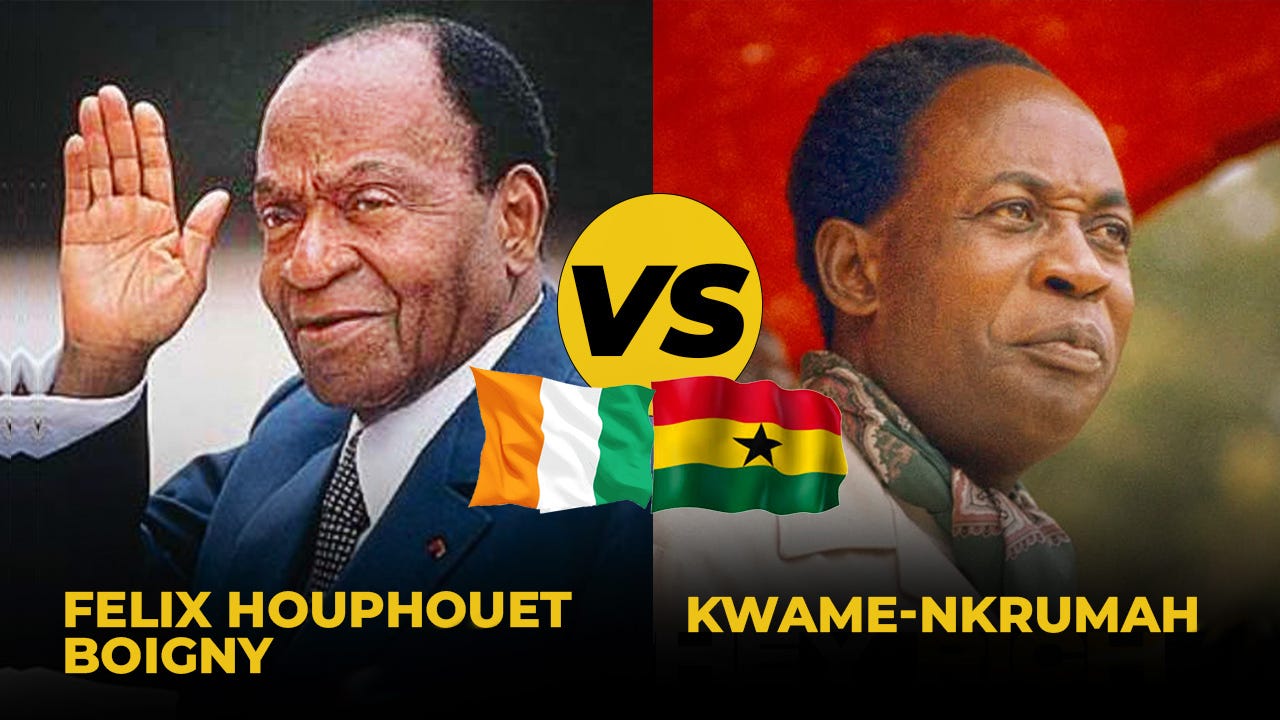Prescript: for the full experience, this is the song I was listening to while writing this. It is called “Strugglin’”, by K’naan.
Let me tell you about a fascinating bet that teaches us everything we need to know about development in Africa.
In the 1960s, as African nations were gaining independence, two presidents made what seemed like a crazy wager. The leaders of Ghana and Ivory Coast bet on which country would become more prosperous in the years ahead.
At first glance, this looked like a terrible bet for Ivory Coast's president. Why? Because Ghana had everything going for it:
More natural resources, including gold mines
Better infrastructure from the colonial period
More educated people
Higher income per person
A thriving cocoa industry
It would be like betting that a small corner store could outperform a well-funded supermarket. But Ivory Coast's president knew something fundamental about economics that many African leaders still haven't grasped today.
He understood that prosperity doesn't come from what's in the ground. It comes from what's in your policies.
You see, Ghana had chosen to run its economy through government control. They believed that having smart people in government offices making all the economic decisions would lead to faster development. This is what many African countries believed at the time - and sadly, many still believe today.
Ivory Coast chose a different path. They decided to trust markets more than bureaucrats. They made it easier for people to start businesses, trade freely, and keep what they earned. They welcomed foreign investors instead of treating them with suspicion.
What happened next is remarkable.
By 1982, Ivory Coast had so thoroughly outperformed Ghana that even their poorest citizens - the bottom 20% - had higher incomes than most people in Ghana. Think about that for a moment. The poor in Ivory Coast were better off than the middle class in resource-rich Ghana.
Now, whenever I tell this story, someone usually says: "But maybe Ivory Coast had better people? Or better soil? Or better something?"
The answer is no. We know this because of what happened next.
In later years, a new generation of politicians in Ivory Coast fell into the same trap that had failed Ghana. They started believing that government should control more of the economy. They increased regulations, expanded state control, and made it harder to do business.
Meanwhile, Ghana finally learned from its mistakes. They started removing government controls. They made it easier to start businesses. They welcomed investment. They trusted markets more than bureaucrats.
And guess what? The exact same experiment produced the exact same results. Ghana's economy started growing. Ivory Coast's declined.
This story carries a powerful lesson for Africa today. When I hear leaders talk about "government-led development" or "state control of resources," I want to tell them about this bet.
“Those who cannot remember the past are condemned to repeat it.”
- George Santayana
Development isn't complicated. There's no magic formula. The path to prosperity is actually quite simple:
Make it easy to start businesses
Protect property rights
Keep taxes reasonable
Welcome investment
Let people trade freely
That's it. That's the secret.
It's not exciting. It won't make for revolutionary speeches. But it works. It worked in the 1960s when Ivory Coast tried it. It worked in the 1980s when Ghana tried it. And it's working today in every African country that tries it.
So next time someone tells you that Africa needs more government control to develop, tell them about the Ghana-Ivory Coast bet.
Sometimes the best lessons come from a simple wager made decades ago.
Cheetah’s Catch

While pondering the rich tapestry of African history, I came across a fascinating 17th-century illustration.
It shows musicians in Angola playing the marimba, a vibrant percussion instrument that's an integral part of our musical heritage.
How awesome is that? 🤩






Great write-up, me and fellow economist Lipton Matthews were chatting about this exact same topic and bet a few days ago for a book that we're drafting.
I first learnt about the rise of the Ivorian economy and the instrumental role their long-time leader Félix Houphouët-Boigny played in this from a great Thomas Sowell video:
https://www.youtube.com/watch?v=sSfJ_0Hdpz8
Informative, appropriate story. Elegantly simple - beautifully expressed as always Magatte.